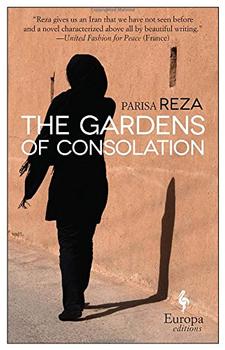Summary | Excerpt | Reading Guide | Reviews | Beyond the book | Read-Alikes | Genres & Themes | Author Bio

A Novel
by Barry UnsworthUnsworth has a narrative style that sneaks up on you. Understated, subtle but
not slow moving, each sentence entices, lures, teases, dares you to read the next
until you are immersed in a place, a time, a convergence of personalities that
you can't get out of your head. And that's okay, because Land of Marvels
proves you can trust this Booker Prize winning author. The characters are true
to themselves. The place is familiar yet exotic and more than a little scary.
And the times, well, the more they seem different and foreign the more the feel
all too uncomfortably familiar.
British archeologist John Somerville is supervising a dig at a site called Tel
Erdik located in the desert somewhere near the confluence of the Tigris and
Euphrates Rivers in the spring of 1914. Since he has invested all that is left
of his money into this effort he is hoping beyond hope to unearth a
career-making discovery. Something of archeological significance that would
attract investors in future digs and assure his ability to continue a career
he's aspired to ever since he was a child. But right now it's not looking very
promising.
His crews have been working too long and turning up too little in the way of
artifacts. What's more, a railroad being constructed by the Germans threatens to literally plow through Tel Erdik, and Somerville's site, placing increased urgency on this already frantic search. Or at least that's what
Jehar, Somerville's paid Bedouin informer, would have him believe. What
Somerville doesn't know is that the illiterate-but-silver-tongued Jehar will say
or do almost anything to stockpile enough money to so he can make the lovely
Ninanna his wife.
Speaking of wives, to say that John's wife Edith Somerville is aloof is almost a
criminal underestimation. Goodness knows why she's along for this ride. At the
same time she claims to have married John for his passionate love of archeology
she is put off by the desperation that oozes from his pores as the dig appears
to be going downhill. She is judgmental and rarely engages with others in this
isolated place until the dashing and also silver-tongued American geologist Alex Elliott shows up and proceeds to charm the pants off – both figuratively and
literally in at least one case – everyone.
Once all the major players are in place the fun begins as conflict rages over
who will get what from whom and/or where and whose treasure has the greatest
importance. Somerville believes artifacts and treasures of the past outweigh the
chauvinistically national claims anyone might have on other items, such as oil
or railroad right-of-way. Obviously Elliott, working on behalf of a moveable
feast of oil interests, disagrees. Others, like Somerville's British
industrialist associate, believe nationalism is most important in those months
leading up to war. And yet as Unsworth points out, "below the patriotic bluster
and the public pronouncements, money worked in silence to make partners of
enemies, to form alliances of a different kind, too profitable to risk
breaking."
Overall, it is money that moves the plot along – even Somerville is motivated by the stuff as it is what will allow him to continue his archaeological pursuits - until
the twist-filled crescendo. To borrow a baseball analogy, Unsworth's windup may
be slow and steady but his pitch packs a wallop in a rock 'em sock 'em finale
that feints left, then right, then back again and left me, mouth agape, in awe.
About the Author
 Barry Unsworth (b. 1930) won the Booker Prize for Sacred Hunger (1992); his next novel, Morality Play, was a Booker nominee and a bestseller in both the United States and Great Britain. His other novels include The Ruby in Her Navel, The Songs of the Kings, Losing Nelson, After Hannibal, The Hide, and Pascali's Island, which was also shortlisted for the Booker Prize and was made into a feature film.
Barry Unsworth (b. 1930) won the Booker Prize for Sacred Hunger (1992); his next novel, Morality Play, was a Booker nominee and a bestseller in both the United States and Great Britain. His other novels include The Ruby in Her Navel, The Songs of the Kings, Losing Nelson, After Hannibal, The Hide, and Pascali's Island, which was also shortlisted for the Booker Prize and was made into a feature film.
He was born in Wingate, a mining village in Durham, England. After graduating from the University of Manchester in 1951, he lived in France for a year teaching English. In the 1960s he traveled extensively in Greece and Turkey, lecturing at the University of Athens and the University of Istanbul. In 1999 he was a visiting professor at the University of Iowa's Writers' Workshop. In 2004 he taught literature and creative writing classes at Kenyon College in Ohio. He currently lives in Umbria, Italy.
![]() This review was originally published in The BookBrowse Review in January 2009, and has been updated for the
January 2010 edition.
Click here to go to this issue.
This review was originally published in The BookBrowse Review in January 2009, and has been updated for the
January 2010 edition.
Click here to go to this issue.

If you liked Land of Marvels, try these:

by Parisa Reza
Published 2016
Against the backdrop of a rapidly changing Iran, Parisa Reza has written a powerful love story filled with scenes of hope and heartbreak.

by Louis de Bernieres
Published 2005
Epic in its narrative sweep, steeped in historical fact yet profoundly humane, and dazzlingly evocative in its emotional and sensual detail. This is de Bernières' first book since Captain Corelli's Mandolin.
Your guide toexceptional books
BookBrowse seeks out and recommends the best in contemporary fiction and nonfiction—books that not only engage and entertain but also deepen our understanding of ourselves and the world around us.